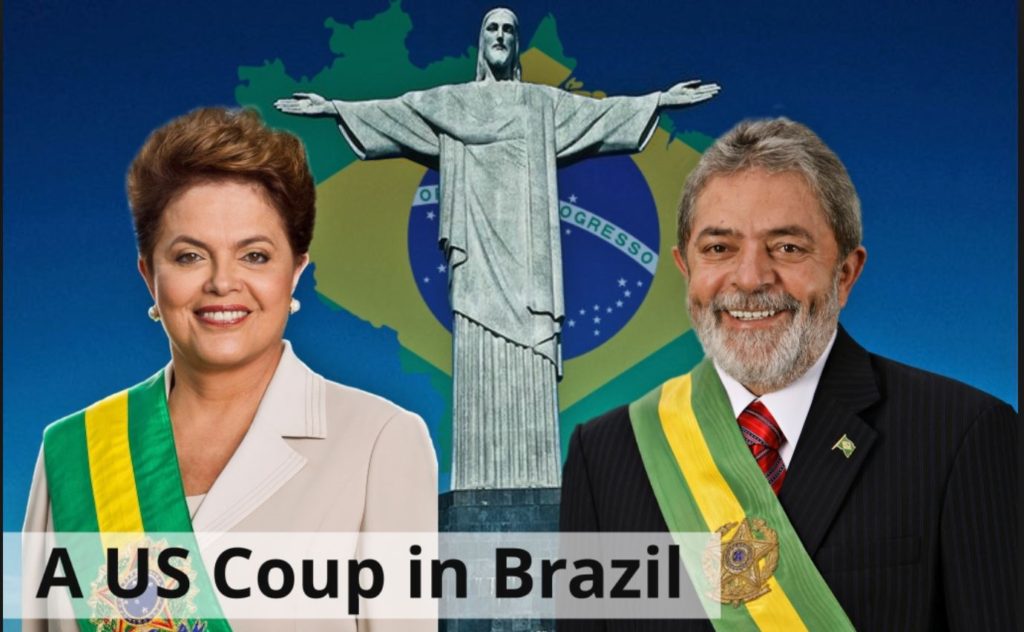by Leonardo Boff
Eco-Theologian-Philosopher, Earthcharter Commission
Recent events: the refusal to allow 1980 Nobel Peace Prize Laureate, Adolfo Perez Esquivel, and other important politicians to visit former President Inacio Lula da Silva, a political prisoner, and friend of all who wanted to see him, is the best evidence that we live under an exceptional juridical-mass media regime. The robes rule. Judge Catarina Lebbos, the right hand of Judge Sergio Moro, showed signs of cruelty and inhumanity when she refused to allow a physician to check on the health of the prisoner President. I am not sure, but I even suspect that this was a criminal act, warranting punishment.
The most serious aspect of our crisis is the strategy for breaking the social pact built under the hegemony of the progressive democratic forces contained in the 1988 Constitution. It is espoused by the wealthiest 0.05% of the Brazilian population, associated, as always, with the economic-financial consortia, even foreign ones, including the conservative monopolies of our mass media.
Thanks to the consensus the 1988 Constitution engendered among different, even antagonistic, groups, it formed the basis for the creation of a Brazilian Social State. It was a first step to addressing our worst wound, the perverse social inequality, thereby accomplishing the inclusion in the citizenry of millions of Brazilian men and women.
A US Brazilian Coup that will boomerang here?
The leader was someone never accepted by the backward elites, who had to bow to the verdict of the voting booths; a worker who came from the impoverished North: Luis Inacio Lula da Silva. With his social policies, he had ensured that all those of the lower classes could climb up one step on the social ladder.
When the old elites realized that a new hegemony could arise, one of a progressive popular character, the elites, as has always occurred in Brazilian history, according to our best historians such as Jose Honorio Rodrigues, plotted a class coup. It was about ensuring the means by which they accumulated their wealth, and their control of the state apparatus, from which they plunder their millions.
Times change and strategies also change. It would not be a military coup, but a parliamentarian one. In his main declaration, Marcelo Odebrecht, president of one of the largest Brazilian enterprises, confessed that he had paid ten million Brazilian Reales to buy 140 representatives who guaranteed the impeachment of President Dilma Rousseff and usurpation of the power of the State.
A Congress, one of the most mediocre in the history of the Brazilian republic, with some members who are thieves, others who are accused of corruption or crimes, including murder, with venality, allowed itself to be bought. They accomplished a parliamentary, juridical and mass media coup, unseating legally elected President Dilma Rousseff through a questionable impeachment. The target was not really President Rousseff, but to get at former President Lula and the Labor Party, PT.
The struggle against corruption, the endemic decease of Brazilian politics that must never be excused, served as a pretext for attacking, putting on trial and literally persecuting President Lula, through the proceedings of the lawfare (hastily interpreting the law to hurt the accused). It was so effective that they managed to throw President Lula in jail, through a process that, according to most well known national and foreign jurists, was corrupt and lacked concrete evidence.
What is the main meaning of this coup? To maintain the nature of the accumulation of a rapacious group that controls and pockets a great part of our wealth. But the most disastrous consequence, well analyzed by social scientist Luiz Gonzaga de Souza Lima in a November 22, 2017 conference in Fiocruz, Rio de Janeiro, is found in the PEC 55 Constitutional Amendment. That Amendment not only tries to establish a ceiling on expenditures, it threatens the country. «The PEC», says de Souza Lima, «is the prohibition against constructing a Social State in Brazil. It Constitutionally vetoes the construction of the Social State; it is more than the freeze on expenditures».
The backward classes opted for the past, accepting that Brazil, be recolonized, in line with the interests of the Capitalist empire of the United States. Not through an election, but with a coup, they dissolved the pact created by the 1988 Constitution. de Souza Lima continues: «we now have a coup against the Government elected by the Brazilian people. We are facing a historic inflection point of immense importance: to constitutionally prohibit social investments, especially in education and health».
This is a unique case in today’s world. How can an ill and ignorant people advance towards a development fit for a population of more than one hundred million people?
These elites, extremely egotistical, never had a plan for Brazil. They only thought of themselves and of their absurd wealth. Presently they have empowered a right wing that is fascist, authoritarian, violent, and racist and that rejects the people, whom they consider vulgar and contemptible. To our shame, they are partly supported by the Judicial body and by the heavy hand of the military police, capable of repressing and killing, especially the Blacks and the poor.
The struggle now is to regain a minimum democracy, and above all, to re-validate the 1988 Constitution, damaged by the coup, but one which would open a space for peaceful coexistence and human development.

